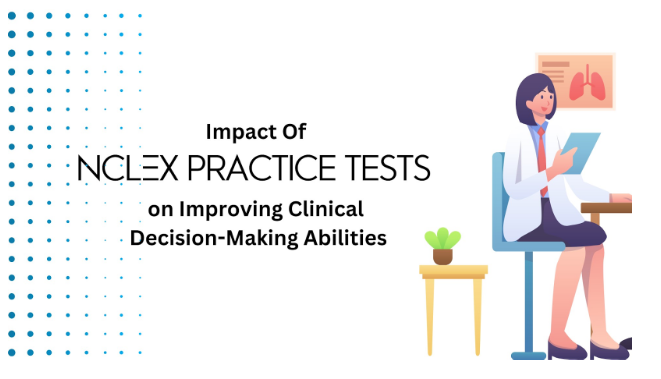Impact of NCLEX Practice Tests on Improving Clinical Decision-Making Abilities
One main aspect of nursing is making clinical decisions swiftly and accurately. The National Council Licensure Examination (NCLEX) is a standardized test that assesses the competence of nursing graduates seeking licensure. NCLEX practice tests have become increasingly popular to prepare for the exam.
However, beyond the exam preparation, these practice tests can significantly impact a nurse’s clinical decision-making skills. So we explore how NCLEX practice questions positively influence clinical decision-making skills and subsequently enhance patient care.
What Is Clinical Decision Making?
Clinical decision-making is a crucial skill for nurses as it allows them to provide evidence-based care, leading to better patient outcomes, higher job satisfaction, and reduced hospital risk.
Consequently, nursing education coursework and practicums should focus on teaching critical thinking and clinical decision-making, preparing nurses to become leaders in delivering high-quality patient care.
NCLEX Practice Tests
The NCLEX exam, administered by the National Council of State Boards of Nursing, offers two exams: NCLEX-PN for practical or vocational nurses (LPNs or LVNs) and NCLEX-RN for registered nurses (RNs) with greater responsibilities and additional education.
- NCLEX-PN: For practical or vocational nurses LPNs or LVNs are the terms used interchangeably in different states, the most entry-level of the licensed nursing positions.
- NCLEX-RN: For registered nurses RNs, who have additional education and greater responsibility.
Three Core Skills of Clinical Decision Making
Good and effective clinical decision-making requires a combination of experience and skills, including pattern recognition: learning from experience.
- Pattern recognition: learning from experience.
- Critical Thinking: removing emotion from our reasoning, being ‘skeptical,’ with the ability to clarify goals.
- Communication Skills: the ability to listen to the patient, their experiences, and their wishes.
What Influences Our Clinical Decision Making
Intrinsic Factors
- Professional experience, skills, and training.
- Context-specific knowledge – mindware gaps lack of knowledge acquired.
- Mindware contamination by incorrect thinking.
- Personal factors like general fatigue, affective state, and sleep deprivation.
- Individual factors like gender, personality, and intelligence.
- Self-reflection
- Communication
Extrinsic Factors
- Patient characteristics: appearance, demeanor, communication issues, and past experiences with the patient.
- The patient’s unique presentation, condition severity, and previous experience with presenting complaints.
- Organizational factors in the medical environment workload.
NCLEX Impacts That Improve Clinical Decision Making
-
Assessment of Knowledge
The NCLEX practice questions test your ability to apply and analyze situations using the nursing knowledge you gained in school. Logic and critical thinking are mainly needed here. Students can identify their strengths and weaknesses, enabling them to focus on areas that require improvement. This is the main impact that influences the NCLEX.
-
Knowing Yourself
Being aware of your behavior, competencies, attitudes, emotions, and values and not just your own but also those of your patients/clients and colleagues. Knowing your limitations is essential – knowing when to seek help, advice, and support. Remember – you are part of a team.
-
Knowing the Patient and Their Preferences
Knowing the patient’s preferences, their experiences of illness, and their current situation or care needs and what is normal for that patient in terms of observation, mobility, and level of function. It’s essential to consider
feedback from decision-making tools that you can use to capture patient information and analyze results.
-
Knowing the Environment
Awareness and recognition of the approach to decision-making and the wider team dynamics within your organization.
The Decision-Making Process
Clinical decision-making typically follows a process from gathering the necessary information to the final decision and outcome. Never before in healthcare history has the focus and formalization of moving evidence into practice been as sharp as today’s research on healthcare transformation efforts.
1. Clinical decision-making involves using cues, systematically gathering and analyzing patient data through direct observations, listening to the patient’s story and concerns, reviewing records, examining lab results, using decision-making tools and assessment data, and considering atypical responses.
2. Making judgments: The patient data on what you think could be happening, looking for patterns, assessing your information needs and who can provide you with the missing information, looking for the evidence to support what you think based on your experience in the area – to make judgments and prioritize these judgments based on the current patient, the situation and the environment in which you are operating.
3. Making decisions: deciding what to do and how to do it, deciding who might need to be informed and consulted. This can include colleagues and, of course, the patient/client involved in the center of decision-making.
4. Evaluating Outcomes: This stage involves assessing whether the desired result has been achieved and may include consulting with others or seeking additional information to make further judgments and decisions.
Dos for an NCLEX Practice Test
Just like success in other challenges is a mix of mental, emotional, and physical factors, you can prepare yourself mentally, physically, and emotionally to manage nursing exam anxiety.
- Make sure you’re prepared for an NCLEX practice questions
- Think positively and visualize success
- Make sure to get exercise, healthy food, and good rest
- Talk to a counselor or a mental health professional if exam anxiety is causing you serious distress.
- Do things that minimize stress, like yoga, listening to music, getting outside into nature, or spending time with pets.
Setting Up for Success
The secret to NCLEX’s success is finding ways to reduce nursing exam anxiety and turn it into a motivational tool. Approach success as a matter of mental, emotional, and physical preparation. Finally, talk to someone you trust if you find that anxiety is causing you serious distress. A professional can show you how to manage your feelings and prepare you to succeed and begin your nursing career.
Frequent Queries we clear for you
Q. What is the purpose of the NCLEX Test?
A. To determine if it is safe for you to begin practice as an entry-level nurse
Q. How many times can you take NCLEX Test
A. As many times, probably eight times in a year
Q. How do I build confidence in NCLEX?
A. Practice, practice, practice. Only through practice tests we can succeed.


